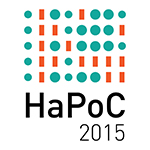The epistemology of web search should reveal something about search as a method of knowledge acquisition, or something about knowledge itself, or even something about the World-Wide Web. Search, treated as testimony, is an attempt to fill a knowledge gap surrounded by rich context. In a library or conversational setting, that context is readily available, but not when search executes only the method of pattern-matching on a search string. Web search failures, in particular, are revealing, as results returned often show misdirection of some reference. When the result is true in spite of that, this search blunder resembles the Gettier problem, except that Gettier problems in human conversation are easily rectified. Informally, the transfer from web page to search engine severs the flow of semantics. Floridi's principles for knowledge give a platform for explanation. The erotetic model invoked requires that an item of information be expressible as a question, carrying all of the context, with a binary answer. Failing that requirement means that the further criteria of correctness and relevance are not achieved; hence the aleatorization of information cannot be resolved, raising the question whether knowledge can still be delivered.
- Presentation
- Other

 PDF version
PDF version
